Seetharami Seelam
Cost-Efficient LLM Training with Lifetime-Aware Tensor Offloading via GPUDirect Storage
Jun 06, 2025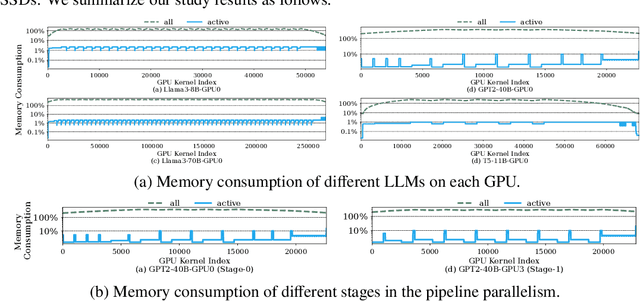
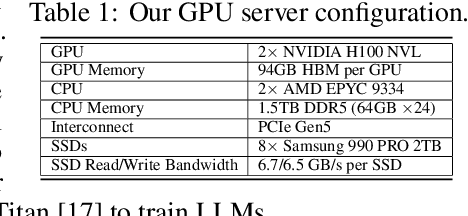


Abstract:We present the design and implementation of a new lifetime-aware tensor offloading framework for GPU memory expansion using low-cost PCIe-based solid-state drives (SSDs). Our framework, TERAIO, is developed explicitly for large language model (LLM) training with multiple GPUs and multiple SSDs. Its design is driven by our observation that the active tensors take only a small fraction (1.7% on average) of allocated GPU memory in each LLM training iteration, the inactive tensors are usually large and will not be used for a long period of time, creating ample opportunities for offloading/prefetching tensors to/from slow SSDs without stalling the GPU training process. TERAIO accurately estimates the lifetime (active period of time in GPU memory) of each tensor with the profiling of the first few iterations in the training process. With the tensor lifetime analysis, TERAIO will generate an optimized tensor offloading/prefetching plan and integrate it into the compiled LLM program via PyTorch. TERAIO has a runtime tensor migration engine to execute the offloading/prefetching plan via GPUDirect storage, which allows direct tensor migration between GPUs and SSDs for alleviating the CPU bottleneck and maximizing the SSD bandwidth utilization. In comparison with state-of-the-art studies such as ZeRO-Offload and ZeRO-Infinity, we show that TERAIO improves the training performance of various LLMs by 1.47x on average, and achieves 80.7% of the ideal performance assuming unlimited GPU memory.
Transforming the Hybrid Cloud for Emerging AI Workloads
Nov 20, 2024



Abstract:This white paper, developed through close collaboration between IBM Research and UIUC researchers within the IIDAI Institute, envisions transforming hybrid cloud systems to meet the growing complexity of AI workloads through innovative, full-stack co-design approaches, emphasizing usability, manageability, affordability, adaptability, efficiency, and scalability. By integrating cutting-edge technologies such as generative and agentic AI, cross-layer automation and optimization, unified control plane, and composable and adaptive system architecture, the proposed framework addresses critical challenges in energy efficiency, performance, and cost-effectiveness. Incorporating quantum computing as it matures will enable quantum-accelerated simulations for materials science, climate modeling, and other high-impact domains. Collaborative efforts between academia and industry are central to this vision, driving advancements in foundation models for material design and climate solutions, scalable multimodal data processing, and enhanced physics-based AI emulators for applications like weather forecasting and carbon sequestration. Research priorities include advancing AI agentic systems, LLM as an Abstraction (LLMaaA), AI model optimization and unified abstractions across heterogeneous infrastructure, end-to-end edge-cloud transformation, efficient programming model, middleware and platform, secure infrastructure, application-adaptive cloud systems, and new quantum-classical collaborative workflows. These ideas and solutions encompass both theoretical and practical research questions, requiring coordinated input and support from the research community. This joint initiative aims to establish hybrid clouds as secure, efficient, and sustainable platforms, fostering breakthroughs in AI-driven applications and scientific discovery across academia, industry, and society.
The infrastructure powering IBM's Gen AI model development
Jul 07, 2024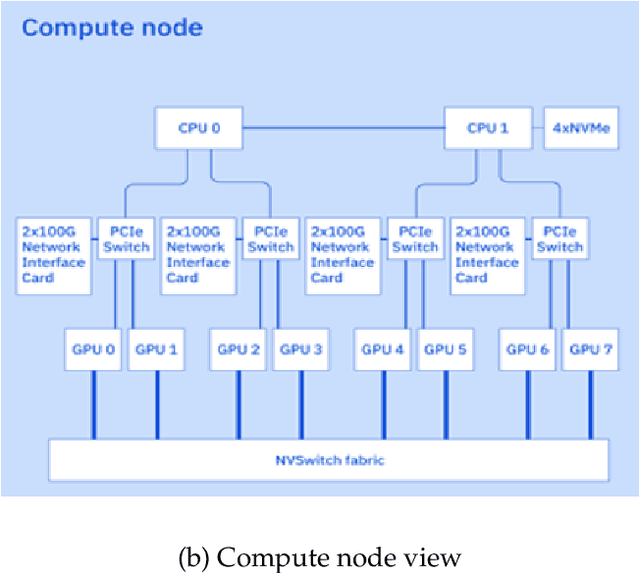
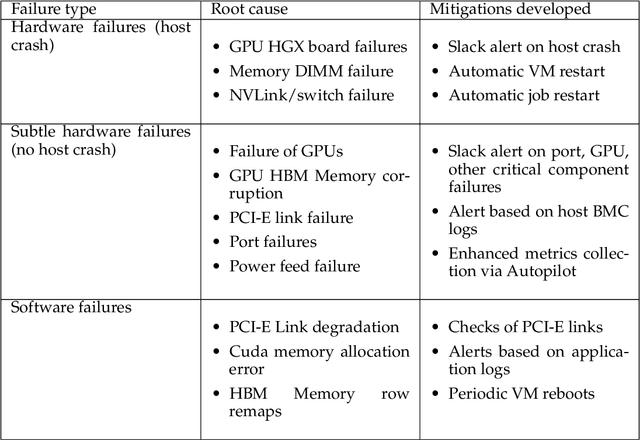
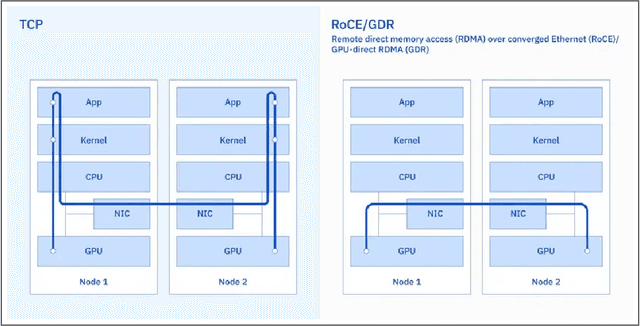

Abstract:AI Infrastructure plays a key role in the speed and cost-competitiveness of developing and deploying advanced AI models. The current demand for powerful AI infrastructure for model training is driven by the emergence of generative AI and foundational models, where on occasion thousands of GPUs must cooperate on a single training job for the model to be trained in a reasonable time. Delivering efficient and high-performing AI training requires an end-to-end solution that combines hardware, software and holistic telemetry to cater for multiple types of AI workloads. In this report, we describe IBM's hybrid cloud infrastructure that powers our generative AI model development. This infrastructure includes (1) Vela: an AI-optimized supercomputing capability directly integrated into the IBM Cloud, delivering scalable, dynamic, multi-tenant and geographically distributed infrastructure for large-scale model training and other AI workflow steps and (2) Blue Vela: a large-scale, purpose-built, on-premises hosting environment that is optimized to support our largest and most ambitious AI model training tasks. Vela provides IBM with the dual benefit of high performance for internal use along with the flexibility to adapt to an evolving commercial landscape. Blue Vela provides us with the benefits of rapid development of our largest and most ambitious models, as well as future-proofing against the evolving model landscape in the industry. Taken together, they provide IBM with the ability to rapidly innovate in the development of both AI models and commercial offerings.
Granite Code Models: A Family of Open Foundation Models for Code Intelligence
May 07, 2024



Abstract:Large Language Models (LLMs) trained on code are revolutionizing the software development process. Increasingly, code LLMs are being integrated into software development environments to improve the productivity of human programmers, and LLM-based agents are beginning to show promise for handling complex tasks autonomously. Realizing the full potential of code LLMs requires a wide range of capabilities, including code generation, fixing bugs, explaining and documenting code, maintaining repositories, and more. In this work, we introduce the Granite series of decoder-only code models for code generative tasks, trained with code written in 116 programming languages. The Granite Code models family consists of models ranging in size from 3 to 34 billion parameters, suitable for applications ranging from complex application modernization tasks to on-device memory-constrained use cases. Evaluation on a comprehensive set of tasks demonstrates that Granite Code models consistently reaches state-of-the-art performance among available open-source code LLMs. The Granite Code model family was optimized for enterprise software development workflows and performs well across a range of coding tasks (e.g. code generation, fixing and explanation), making it a versatile all around code model. We release all our Granite Code models under an Apache 2.0 license for both research and commercial use.
 Add to Chrome
Add to Chrome Add to Firefox
Add to Firefox Add to Edge
Add to Edge